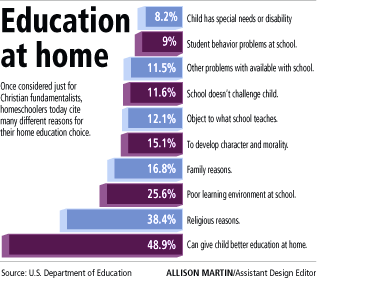Understanding the Possibilities of Homeschooling
The Homeschool Strategies
Many people do not realize homeschooling has different teaching strategies. These strategies exist because it is better to have more choices in life. Not every child learns the same way. Some children learn from hands on tasks. Other kids learn with someone helping them along. Or certain children can learn completely on their own. To help students there are three strategies: the parents, a teacher, and the computer.
The Homeschool Statistics

The Parent
With today's busy society, keeping track of your children and their learning process can be difficult. Before you say "I could never teach my children anything", you can learn with them. You can attend a conference in the summer months. Some states have homeschool conferences each year. One of the largest conferences exists in The Woodlands, Texas every August. There are speakers, booths, and children groups. You can learn about lesson plans for you and your child to study together. There are at least a dozen programs for you to choose from. As the homeschool community has grown, so have the methods of teaching. There are curriculums with their own study guides, tests, and even videos. Many parents do not even need to know the material. However, during high school the parent should not have to know the material. This is a time to keep track of your child's progress and ability to succeed in college.
A Teacher
Some children need a teacher, much like myself. But where can you find a teacher outside of public or private school? Believe it or not, there are homeschool teachers who give classes. If you do not feel comforatble teaching your child, you can find one of these teachers. It would be like getting a nanny or tutor. The same way you drive your child to piano lessons is how you would drive your child to Spanish or Algebra.
For example, in the Houston area there are different homeschool groups. They have educators who hold classes and teach the students. In one enstance a bunch of homeschooling mothers come together at a house on the outside of town. Each mother helps out with the learning process. They watch the children play or help them with homework. Mother's hold the classes and teach the students. There is a verterinary class, a chemistry class, calculus course, and even an astrology course.
For another example, there are retired educators who teach as well at a church or in their homes. These teachers hold classes for parents to sign up their children for. These classes normally cost $10-$30 per class. These educators could be certified teachers or retired college professors or a bachelors graduate. You can chose who will teach your child, a preferred method for many parents with children in public school.
The Computer
For students who can learn on their own, use the computer. Some teachers also use skype to teach. The teacher can see the students and the students can see the teacher. They learn together and watch the lecture using skype. Online classes are part of the future. Colleges hold online classes every semester. Most of the papers must be printed out or emailed to the instructor. Your child learns how to follow online directions. In their minds, the directions are not from a teacher, they just exist. It's the best choice if your child is in high school. If your homeschool child ever graduates, he/she can take college classes online from home. They will learn what is necessary to succeed and survive in college.
Curriculums
There are many different curriculums out there for your child to learn from. While most in the homeschool community are Christian, such as Abeka, there is always more than one way for your child to learn.
- Traditional - The usual method requires graduating from high school. To qualify as a high school graduate, or even be considered, you must go to your state education requirements. I suggest printing these out because you will need these near each school year to plan your child's class schedule. Many homeschoolers study throughout the summer so the number of classes required for graduation are lessened. However, many homeschoolers still graduate from high school when they are 18. Quite a few homeschooling moms enjoy watching their children go through the graduation process. Most curriculums at homeschool conventions know of these high school requirements and offer different options of extracurricular studies for your child to take through their curriculum.
- Non Traditional - This method involves any other researching choice the family could make. A family could decide to keep to the basics: writing essays, reading comprehension, and mathematics. These students study anything that interests them. For example, a child interested in theater would take acting, singing, speech, dialog, story writing, lighting, etc. Or a child interested in studying human behavior would read books on psychology, sociology, philosophy, cultural differences, etc. Many families like this method because it is more focused on how teaching used to be at home. However, there are many college professors who homeschool their children based off of curriculum the parents design themselves. The parents believe high school requirements leave out other knowledge that is more beneficial to their children. This could be gaining a boating license in case of a flood, taking a course on statistics at the community college to prepare for a career choice, or studying a finance textbook to learn about personal finances and taxes.
Community College
While some homeschoolers follow state requirements for high school, there are a few who follow the less taken road: college credit. For many parents this is their dream for their child. Dual-credit usually costs less than regularly attending a college. Even so, there is a limit as to how many classes dual-credit students can take. This is usually 2 courses a semester. After, if your child makes wonderful grades, they are encouraged for more course work by special request. This is exceedingly rare as dual-credit students are supposed to be taking other courses at their high school. For a child to take courses at a college for dual-credit, a transcript is usually required. This is helpful for those who have taken courses or use curriculums. Their grades are of easy access. However, those who do not follow a curriculum but do independent study are usually forced to take a different path.
Student who study without a curriculum or course work must pass the entrance exams into the college, usually a community college. The entrance exam does cost money and is based on reading level, basic mathematics, and sentence structure. A few parents focus on their children passing this test then enroll their children directly for college credit. This is only possible at some community colleges. For example, I have seen an 11 year old on a community college campus with a calculus book before. These children are usually knowledgeable not only in the course materials but also in study habits and even learning styles. There are some homeschoolers who "graduate" high school with an associates degree, or even the more unheard of, with a bachelors degree.








